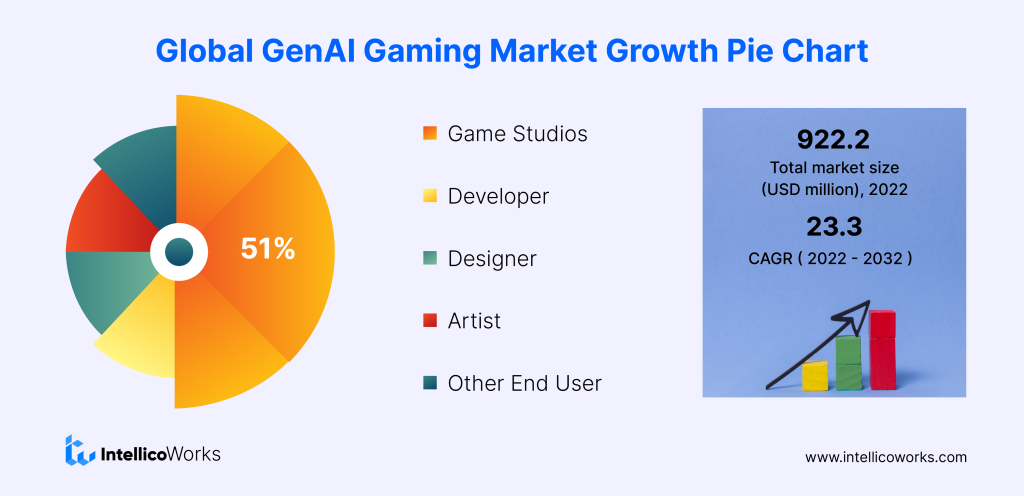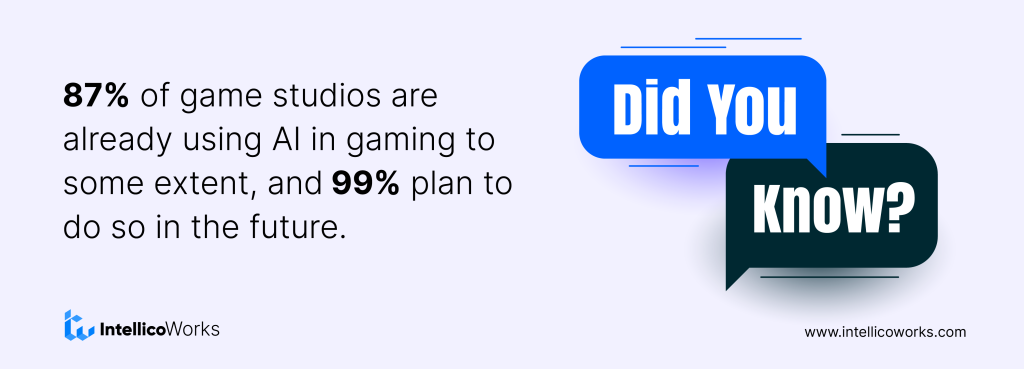When teams operate independently, it creates communication gaps that can lead to disorder. In contrast, when teams collaborate, they tend to be more efficient.
The gaming industry has gone through a major change within the last few years. The huge factors responsible for this transformation were the popularity of AI in sports apps, online betting, competition among game developers, and the adoption of technologies like artificial intelligence. Today, we are talking about how AI in gaming delivers more adaptive experiences that foster innovation and unlimited opportunities for the gaming industry. Before, that let’s revive, how it started. Back in 2020, game enthusiasts were homebound due to the COVID-19 pandemic. They found new ways to satisfy their gaming urge. This made online gaming popular and the industry grew to 2.5 billion active gamers worldwide. In 2024, AI has been changing the whole gaming industry with more technologies coming like machine learning, NLP and NPCs, it will only add more fuel to the fire.
In this blog, we will learn about what AI and gaming hold for the future and how these next-generation technologies are changing the whole concept.
The number of gamers is expected to reach 1.66 billion by 2026. According to business2community, in 2023, the gamer community was predicted to grow at least 3.38 billion which represented that year by year it will grow 6.3%. However, newzoo reported, almost half of $85.8 billion revenue will come from the Asia Pacific region. It is reported that the largest financial share could come from developing non-player characters (NPCs) that is followed by level generation and image enhancement. Game studios that are using these features are generating more revenue. Developers come second and then designers and artists.

The intersection of AI in video games gave rise to immersive gaming experiences. This trend is now unstoppable as developers are experimenting with games with new AI technologies bringing more engaging and responsive gaming aspects. Let’s explore areas where AI in gaming can make its marks of implementation:
AI-based games have revolutionized the development of NCPs. These characters can be controlled by real players to behave intelligently. This technology is powered by AI algorithms like machine learning models and neural networks. NCPs can analyze game situations and adapt human interaction to make decision-making skills close to each player’s dynamics. However, they are automated on pre-programmed rules that cannot be controlled by game players. Many game companies leveraged this technology to improve strategies through trial and error. A main example is Seed (EA).
AI has enhanced visuals and upscaled deep learning techniques. AI upscaling analyzes low-resolution images and upscales them to higher resolution without losing the quality. The technology also works on classic games even on older hardware. The major player for this use case example is NVIDIA DLSS technology. Their DLSS technology employs upscaling in games to deliver high-resolution graphics for improved frame rates. This allows players to alter any scene within the game.
Video games have multiple aspects like 3-D objects, characters, props, clothing, scenes, music, graphics, levels, maps, quests, weapons, and more. However, developing these assets is not an easy task. It requires huge investments and good developers. Using this generative model, developers can generate diverse worlds, and simplify the process of asset generation that excels to the user needs. For instance, OpenAI’s GPT-3 language model offered AI Dungeon 2 an innovative text-based adventure game model. This showcases that if you give relevant prompts to AI, it can generate unique storylines for gaming characters.
PEM is the latest AI trend in gaming for mathematically modelling gamers to anticipate their liking and dislikes of a game. This involves AI modelling that predicts and gets trained on players’ preferences and behavior. AI does this by machine learning techniques to analyze players’ data like gameplay style, actions, and reactions to game scenarios and conditions. After gathering and learning all the data, AI models adjust game elements and create a personalized experience by modifying game difficulty for the player’s profile.
Global gamers generate vast amounts of data which is used by machine learning algorithms to analyze. this analysis helps generate valuable insights into user behavior, game performance issues and trends. DemonWare, an online multiplayer game uses predictive data analytics to understand player behaviours and optimize game performance and resource allocation based on these insights.
AI-driven sentiment analysis utilizes natural language processing technology to evaluate player feedback. This feedback includes text data from reviews, forums, and social media, identifying key themes and sentiments. This data provides developers with insights into player preferences and areas for improvement. For example, Riot Games uses AI tools to analyze player discussions on League of Legends, guiding in-game updates and enhancements.
Cheating in multiplayer games is a common challenge. This impacts negatively on player experience and gaming platforms. AI can be used to analyze players’ movement patterns and detect cheating. Popular online games like PUBG already use AI tool to combat the growing risks of cheating and ensure fair gameplay for all players.
AI have advanced tools for game testing. It tests and debugs using automated algorithms to scan game code, identifying anomalies, potential bugs, and performance issues. As a result of using AI, it reduces time and resources, resulting in a polished final product.
Modern games have in-game AI assistants. These AI agents use natural language processing to understand players’ queries and respond accordingly. Using the gathered information they provide relevant guidance that results in increasing user engagement and retention rate during gameplay.
AI gaming provides immersive user experiences. However, this technology continues to evolve and new trends are coming. Recent AI trends in gaming highlight the importance of AI in enhancing user experience:
GenAI in gaming enables developers to create unlimited and ever-changing content. It provides a unique gaming experience. For example, Minecraft is a game that ensures that players can’t leave the virtual world. Generative AI also creates realistic and progressive NPCs that can evolve, learn, and adapt, making games unpredictable and replayable.
Cloud-based gaming is the future of gaming. It allows players to enjoy high-end games on any device, including smartphones. This eliminates the need for downloads, installations, or expensive consoles. AI, based on Deep Neural Networks (DNN), enhances cloud server performance. It ensures a seamless gaming experience even with outdated hardware. Players can resume gameplay anytime on any device, ensuring they don’t lose their progress.
Non-fungible tokens (NFTs) in the gaming industry enable in-game economies. These economies allow players to trade digital tokens and make games more rewarding. Blockchain technology tracks and protects player ownership, creating a more inclusive and transparent gaming ecosystem. AI plays a role in NFT development by analyzing player data to predict asset preferences, resulting in more targeted content and personalized gaming experiences.
AI is revolutionizing gaming by integrating AR, VR, and metaverse, enhancing user experience and creating immersive virtual worlds. This allows players to create virtual worlds and invite friends, enhancing the immersive gaming experience. AI can efficiently design such virtual scenes.

64% of game studios intend to create their in-house machine-learning models that will help streamline the process of creating high-fidelity assets for games. Here are some major players using AI to transform their processes.
AI in gaming has several limitations including the ability to change game mechanics, introduce bias, and introduce problematic content. But, it is significant how AI is transforming and redefining game experiences. With technological advancements, AI can develop games within hours with highly detailed levels, offering personalized experiences for each player. It provides enhanced natural language processing to make AI gaming more real. This realism allows players to interact with characters like humans. As AI continues to develop, it is essential to address these limitations and ensure its continued growth and development.
IntellicoWorks pave as an AI development company. We offer ai software development services for a range of game app development services, including mobile, web3, AR/VR, 3D, and metaverse games. Our AI developers are exceptional in using agile methodologies. We deliver top-notch gaming applications for iOS, Androids, and cross-platforms. Whether you are an entrepreneur or an established enterprise, we leverage AI starting from documenting your goals to ensure smooth app development.
The video game market has been projected to grow to USD 610.6 billion by 2032. This shows how potential AI applications for gaming can be. The case studies of NVIDIA and GTA shows that AI games are more personalized, engaging, and complex. Also, it offers players an excellent gaming experience with realism. Thus, the blend of AI and games can push boundaries of interactive and immersive entertainment.
Ready to Level Up? Explore Our Custom AI Solutions for Your Next Project!

Talk to us and let’s build something great together
A Subsidiary of Vaival Technologies, LLC
IntelliCoworks is a leading DevOps, SecOps and DataOps service provider and specializes in delivering tailored solutions using the latest technologies to serve various industries. Our DevOps engineers help companies with the endless process of securing both data and operations.
Ops
Cloud
AI & ML
Copyrights © 2023 byIntellicoworks. All rights reserved.